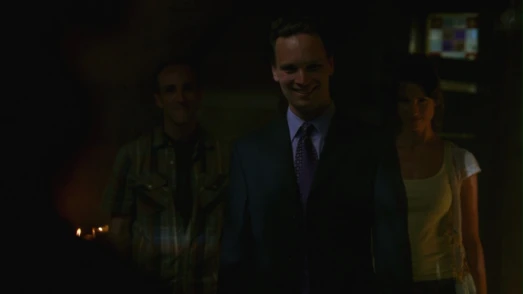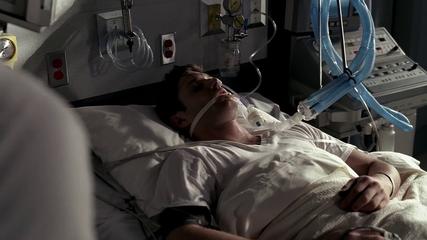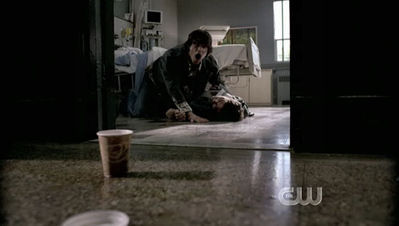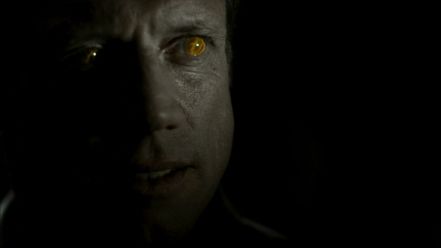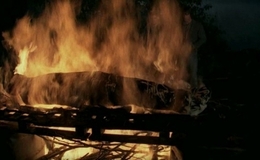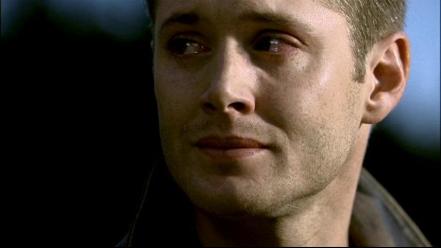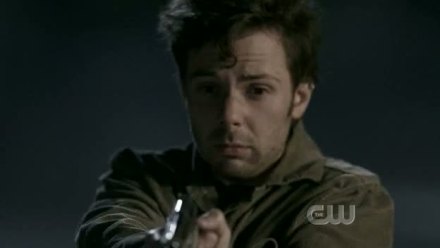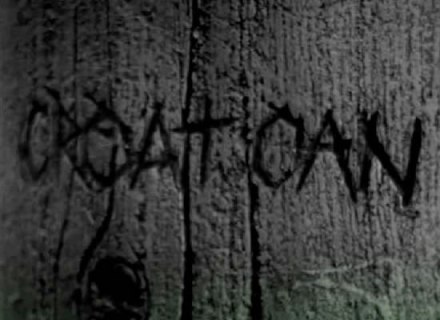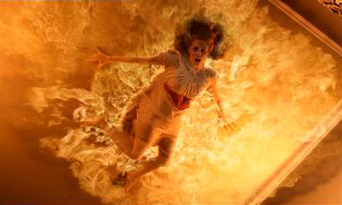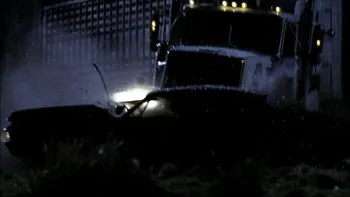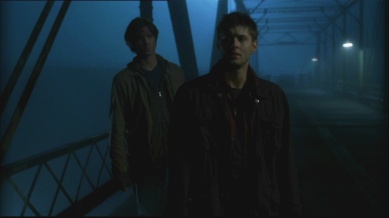
Part 2 is a lot meatier, massively so. It is very reminiscent of what this series becomes moving forward. As such, prepare for a lengthier read.

We begin with an extremely frantic, thrilling, and entertaining episode that simultaneously pushes the season’s arc forward further then any before it. Still, “Hunted” has deeper meaning for our characters and also continues one of the boys’ never ending patterns, as is their plight in case you haven’t been paying attention.

Dean reveals his father’s final words: that Dean must kill Sam if he is compromised due to his “abilities.” Sam takes tremendous offense to this, but attempts to convince Dean to find the other children with him anyway. When Dean refuses, Sam takes off while he sleeps.
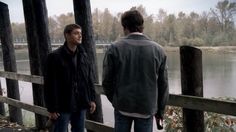
Since this is the second of several times Sam will strut off on his own, I’m going to take a second to asess the one major difference between Sam and Dean pertaining to their relationship: Sam isn’t as inclined to stay attached to Dean as is vice versa. Ultimately they both will do anything for each other when the chips are down, but Sam is capable of separating himself from the relationship if he feels it absolutely necessary. This holds true through season 9 to varying degrees, until season 10 for various reasons. In this way, Sam’s attachment to his brother is not as detrimental even if still unhealthy.

Dean, on the other hand, is on almost every occasion barely able to function without Sam. His thoughts always turn to Sam no matter what the circumstances. This will become depressingly apparent in season 6, where Dean has for all intents and purposes seemingly happily left the “family business,” yet below the surface is completely miserable without him as we come to understand. I’ll touch on it more with that season, but it’s truly horrificly frigthening to experience just how he defines himself by nothing but his relationship with his brother and, to a lesser degree, hunting and violence in general. He places Sam on a pedestal almost to the point he worships him, and can’t function without fighting the urge to kill and hunt.

Sam, through Ash, stumbles upon information about several children where similar “accidents” occurred when 6 months old to their mothers. While investigating one of their murders he meets another psychic just as himself, who tells Sam of her premonition of his death. Gordon (the murderer ) returns and fires at them, missing. Dean confronts him, but is knocked unconscious and taken prisoner.

Gordon reveals to Dean that a demon he exorcised told him Sam will be a soldier in a coming war. Gordon is taking it upon himself to kill Sam before he can be recruited, believing it is inevitable that Sam will turn against his own kind.

Gordon is very short sided and one-track minded. There is nothing but black and white in his world, and as will be solidified later, there never can be no matter the circumstances. Nothing can or will ever waver his determination nor state of being, not having to kill his sister turned vampire without hesitation, nor even eventually being turned into a monster himself. As I’ll elaborate on when this event comes to pass, he represents pure resolution and unhindered self, having no quarrel with (emotionally or otherwise) who or what he is no matter what that may entail. This is why he clashes with the Winchesters, both character-wise and metaphorically: they constantly attempt to battle and change who or what they are, even if a seemingly impossible feat. Yet he is also void of the hypocrisy that is the boys’ relationship and how they will bend their own values for each other, and represents a purity in that regard that the Winchesters lack.
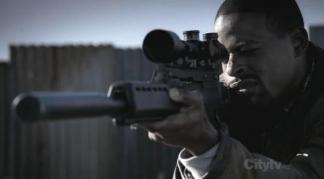
Here specifically, Gordon is a self appointed protector of mankind who’s goal it is to use Dean as bait to lure Sam into the open. Of course, this the scenario seen in the vision, but Sam bites anyway. Only Sam one ups Gordon’s attempts at setting a trap and ultimately escapes with Dean. In his pursuit, Gordon is stopped and arrested by the authorities of whom Sam tipped off. The woman with the visions is found to have been kidnapped after Sam insisted she go home alone, adding to his ever growing guilt.

The only event of note in “Playthings” is that yet another failed attempt at saving someone leads Sam to drink near deadly levels of alcohol, at which point he forces Dean to promise to kill him should he ever go “dark side.” Sam has nearly reached the limit of his ability to cope with his unfounded guilt. Also, whether intentional or not, the limits the apparition in this episode will go to in order to escape lonliness foreshadow and parallel what we’ll eventually come to know about Dean’s character, even as far as to have her still living relative kill herself willingly just so they can be together forever (just as the siblings would do for each other).

“Nightshifter” continues the authority pursuit sub-plot and introduces FBI agent Victor Henrikson, who from here through season 3 will be at the head of the attempts to capture the Winchesters. Sam and Dean are able to escape without being caught.

“Houses of the Holy” is yet another episode foreshadowing the arrival of Angels. Dean’s skepticism and Sam’s faith are further explored. Sam is told by a psychiatric patient that an Angel instructed her to kill a man. Dean is quick to dismiss the possibility, while Sam believes it to be possible, even going as far as to believe God himself may be behind it at one point. Sam also reveals he prays often, to Dean’s surprise and near disgust. It turns out to be just another ghost, yet the spirit knew that a man was going to attack a woman (who he instructs Sam to kill before he can). How he knew is never explained, and in retrospect can be assumed it was some sort of Heavenly intervention. Most likely, it was necessary to nudge the Winchesters destiny in the right direction. This is just an assumption, of course.

The irony of finding out Sam is so religious, reiterating Dean’s skepticism, and what it foreshadows, is that Dean is actually the one connected to the holy order while Sam is to be the vessel of the bringer of destruction. The reversal of roles parallels the plight of Michael and Lucifer: Lucifer being the favorite son, the most devout, only to ultimately rebel against his father. As is anything but subtle, the boys themselves parallel Michael and Lucifer in almost every way. It’s hard to fathom that Kripke never initially intended to introduce Angels or the Apocalyptic Story Arc considering how well the setup is laid out. The symbolism is truly nearly masterfully represented, and their relationship lended itself to the parallels in popular perception of Christian ideology beautifully . Even their father’s abscence and neglegence for most of their childhood parallels how God is represented later on. But all these connections will be thoroughly explored and analyzed in seasons 4 and 5.

Trivia: Lucifer is never actually mentioned in the original Hebrew Bible and most correct translations of today, being originally a mistranslation of the word for Morning Star or Helel used in the King James version, the latter of which is assumed to refer to a Fallen Angel of some sort which is commonly seen in pop culture as being Lucifer. Michael is the one who battles and defeats Satan, who is not actually attributed to Lucifer, the Morning Star, or to even having been an Angel at all. In popular culture, Lucifer and Satan are synonymous.

“Born Under a Bad Sun” is a terrific episode for several reasons. Sam, who has been missing for a week, calls Dean dazed and confused. He is found covered in blood with no memory of the events that transpired over the past week. Through several clues, they happen upon the body of a hunter, and through the security footage realize it was Sam who slayed him. Upon this revelation, Sam asks Dean to do as he promised and kill him since he had turned. Dean refuses, quoting “I’d rather die,” foreshadowing his rash decision at seasons end.

Remember Gordon? He didn’t hesitate to kill his sister once he realized she was a vampire, as previously stated. It’s why he is what he is. However twisted, he rationalizes how dangerous she is no matter how much he may have once cared for her. The Winchesters are not Gordon. They have compassion and the ability to see shades resembling grey. But they also are blinded by how much they care for each other. Matter of fact, they are blinded by how much they need each other. Sam clearly, at this point in the episode, murdered a man in cold blood. Yet Dean is willing to give Sam a pass, something he’d never do – and never does – for anything else save Benny (who himself is a surrogate for Sam, but I’ll get to that at the appropriate time), even another human being when faced with that decision. This is one of the first instances where the inability to rationalize situations that involve each other costs someone else their life, because the signs (although this turns out to be more then it seems) were scattered throughout the season for both to witness, and many more will suffer in their wake in the future due to this dependence and hesitance to take action.

Sam knocks Dean unconscious and proceeds to find Jo, who had “run away” to become a hunter. He bounds her and reveals that John is the one who killed her father, something alluded to earlier in the season. He proceeds to taunt her, even going so far as to imply he’ll defile her.

Dean enters, at which point Sam pleads for Dean to kill him. Dean still hesitates, and Sam delivers a bombshell to the audience in retrospect: that he’d rather watch an innocent die then kill him.

If a witness to the events that unfold up through season 10, you’d know that this rings truer then words can describe. All the way to where we are now as of writing this, “The Werther Project,” where Sam allows a woman to die in pursuit of a cure for Dean’s current plight, Sam and Dean are indirectly and directly responsible for dozens of deaths, including some very close to them. In most cases, their inability to allow the other to be harmed is at least somewhat in play. They reap everything they touch, not out of destiny or forced fate, but because of the decisions they consciously make. This is their curse, their disease, and its something that’s torn their souls into something much worse then monsters or demons. The series downplays these deaths and their roles in them for most of its run, something the writers seem to be finally rectifying. Again, if this were a true retrospective analysis, I might be able to say for certain that consequences truly arise for all the damage they’ve done. But alas, we’ll have to wait and see.
Then, it’s just Meg. No big deal, right? Nomally I’d call this a cop out. But here it works because there’s still a lot for Sam to go through before truly teetering on the edge of darkness. Retrospect helps appreciate certain aspects you’d otherwise despise. And then Sam is eventually restored…

But not before visiting the great Bobby Singer! Bobby is such a badass that he isn’t fooled by Sam. But this is just me having a fan boy moment. Don’t mind me.

Meg is trapped inside a devil’s trap, but is able to escape due to a chant she learned. Dean and Bobby are unable to exorcise her because of a mark seared into Sam’s skin. After Meg beats and nearly kills Dean, all the while taunting him, Bobby burns the mark on Sam’s arm and Meg escapes before they can exorcise her back to Hell. Sam is disgruntled by the fact Dean hesitated to kill him, to which Dean replies he’ll find a way to save him. We’ll hear similar words much too often. Much, much too often.

Speaking of Angels, who needs foreshadowing when you can retcon one in starting with season 2 (although I personally feel this specific retcon actually makes events clearer)? “Tall Tales” is a rioutous romp that simultaneously gives us several laugh out loud moments while introducing us to “The Trickster,” a.k.a Gabriel, the Archangel. Of course, here we don’t know he’s an Angel just yet.

This episode, more then any before it, is a step at proving how clever the writers are at being especially meta without it feeling contrived or out of universe. It’s not without its issues, and most subsequent meta episodes are more humorous and realized to much better effect, quality, care, relevance, and even endearment but it’s still a relatively fun outing that isn’t afraid to poke fun at itself and not feel condescending while doing it.

Oh, and waltzing with aliens. How can you not enjoy that?

The title of the next episode, “Roadkill,” somewhat upsets me. It’s mildly reprehensible considering how endearing it’s one off plot truly is, but I suppose being misleading was necessary considering the titles are revealed during the opening credits. It’s one of the very few stand alone episodes with little in the way of allusions or parallels to seasonal arcs (at least on the surface) that is worth the 42 minutes of investment series-wide.

A husband and wife swerve off the road after narrowly missing a man in the middle of it, crashing into a nearby tree. The woman wakes up to find her husband missing and attempts to flag down Sam and Deans vehicle. They stop and attempt to help her, only her car has disappeared. Sam and Dean reveal that they’ve been hunting a ghost, the same man the couple saw on the road. At the ghosts cabin, Sam explains that ghosts in life, even vengeful ones, could have been very good people. This a rare subtle moment – rather then the obvious parallel via monster device which the boys often make unnecessary note of each time it occurs – that alludes to Sam’s own arc which continues through season 4. He’s a good person who is slowly drifting into darkness, just as ghosts slowly become vengeful due to extreme circumstance or extended periods of solitude. It also foreshadows the coming twist at episodes end.
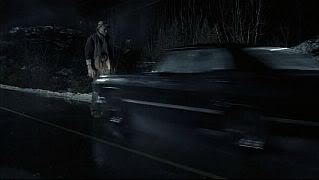
After Sam and Dean burn the ghosts corpse, they take the woman into town and deliver a bombshell to her: her husband is alive and has been living peacefully with another woman. It was she who killed the vengeful spirit and herself in an accident fifteen years earlier, prompting her to relive that night several times over due to her own guilt. After a legitimately heart wrenching breakdown, the woman finally accepts what she had done and fades away into the sunset.

The twist here is well realized and highly satisfying. Yet more then that it provides us with a different perspective on the apparitions Sam and Dean hunt. For all intents and purposes, this woman kept her humanity all those years unlike most ghosts. Her guilt, a very human trait, prevented her from becoming a monster. This also parallels Sam’s arc in a very subtle way, his guilt preventing him from fully accepting his dark fate. It would also prove to be important in understanding Bobby’s untimely death and how he reacts to his own demise.

“Heart” is an example of the non-subtle parallel to character arcs with it’s stand alone plot that the series will get extremely comfortable utilizing. Still, it’s a relatively well staged one with at least some subtlety that truly highlights the urgency of which the boys must deal with Sam’s predicament.

Basically, Sam falls for a woman who happens to be a werewolf after rolling through town with the intent on hunting one. It is suggested that, according to myth, a werewolf can be cured if the sire is killed. Dean sets out to kill her sire while Sam stays behind to make sure she doesn’t change and hurt anyone. Dean is able to kill the sire, and they stay with her through the next night to make sure she doesn’t change, which she doesn’t. Sam and the woman end up sleeping together the following night. This here is a subtle action that represents Sam giving into a glimmer of hope that he too can be saved. Only issue is, she ends up turning that same night for unknown reasons much to Sam’s despair.

The next morning, she pleads with them to kill her. After offering to do it, Dean steps aside and allows Sam to reluctantly do it himself. The moment is very grim and disturbing. Sam looks legitimately defeated, drowning in his own despair. He takes the gun and fires a round offscreen, effectively killing her. Sam is unable to express his sorrow throughout this scene in words, and his quiet demeanor while relentless tears of sadness flow from his eyes proves just how hopeless he feels. He’s all but given up at this point at ever finding a way to cure himself and avoid the fate Azazel has in-store for him. It’s the most powerful and resonating moment in his arc for this season, and the one where he hits absolute rock bottom mentally and emotionally.

“Hollywood Babylon” is yet another meta episode in the veign of “Tall Tales.” Yet what this one lacks in legitimate humor, despite some chuckle worthy moments, it makes up for in its exploration of how mediums can be twisted and manipulated by writers having to be forced to assimilate themselves within the system. Directors, editors, etc. all have much more control over the final work then does the writer, who is usually used solely as the rough outliner. Scripts, manuscripts, etc. are often changed highly from the original, undermining the original intent of the writer due to creative and studio differences. It’s almost a breaking of the fourth wall here: where the writers are expressing their frustrations with common practices in Hollywood.

The writers, creators, editors, etc. all have mutual understanding on Supernatural as far as I know, but it’s an exploration in general of how the butchering of media can present itself and how writers are often bottom feeders in the hierarchy of the creative process. One of Supernatural’s greatest strengths is in the episodes that explore these social constructs and mistakes made during the creative process, and here, while not masterful, it’s adequately realized. Again, in the future, these meta explorations are even better presented.

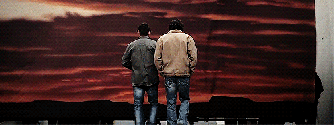
“Folsom Prison Blues” concludes the FBI pursuit sub-plot, at least for this season. The Winchesters are captured, purposely, to investigate mysterious deaths inside a prison. The Winchesters are able to escape and elude Henrickson once again, much to his growing frustration.
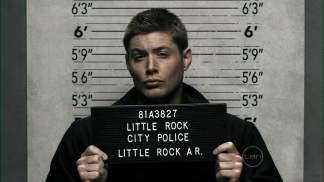
The pursuit arc itself is entertaining enough, and Henrickson at least welcome when on screen. He has a presence that easily makes him interesting in his own right. However, it’s little more then a distraction (filler) to fill the episode count. It is better however then what some seasons use in the future as filler, mostly poorly written one-offs with slight, yet unsubtle, allusions to character arcs. There is one more episode to this arc in season 3, and it is by far the best of the bunch.

Before the final two part conclusion to the Azazel arc, we have a truly exceptional episode in “What Is and What Should Never Be,” arguably the best single episode of the season. Dean and Sam are pursuing a Djinn when Dean is attacked by the pursuee. He wakes up in an unfamiliar setting, a suburban home next to a beautiful woman. Confused, he contacts Sam, who is seemingly still studying Law in college. Dean immediately leaves for his childhood home, finding his mother alive much to his astonishment and joy.

The next day Sam and the mysteriously living Jessica arrive for Mary’s birthday. Dean enjoys a day with his family, void of all the struggles and pain that had become his reality.

Later that night, he catches a broadcast that reports an airplane crash, the same flight that Sam and Dean saved from a demon in “Phantom Traveller.” Distraught, Dean researches all the hunts he and Sam took on, realizing that each one had not been thwarted as they had been originally. In what is a great and very important scene, he visits Johns grave. With great anguish, he asks his dead father why it’s their job to sacrifice in order to help people. With the silence and lack of answers, Dean accepts his fate unwillingly, or so it seems.

What Dean fails to realize is that not only is it his fate, but it’s his desire to continue the life he’s accustomed to. Needless to say, this is a fantasy world created by the Djinn to keep Dean unconscious. But if this truly is his ideal reality, then why in this world does he feel the need to create a reason to continue the hunting lifestyle? It literally can be whatever he so chooses, and he chooses this. As much as he believes he wants a normal existence, underneath it all his ideal is hunting monsters. He enjoys the feeling of freedom, he enjoys the hunt and the kill, and he enjoys the dynamic he and his brother have. All he truly wants is a short reprieve; a vacation from it all. He’ll get that reprieve in season 6, but will yearn for the lifestyle out on the road with his brother to the point he can’t deny it anymore. This is his fate, but it’s also his choice.
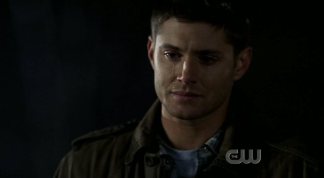
Dean, with Sam, drives to the warehouse he and Sam resided in reality. Here he realizes this world is most likely one created by the Djinn. He concludes (somehow) that killing himself will wake him up. Sam attempts to dissuade him, followed by hallucinations of Mary and Jess (Jess I don’t get) who try to convince him this is where he’ll be happy. Dean ultimately chooses to awaken, leaving his ideal behind. He is revealed to be bound and tied to the ceiling – just as he is to his reality – and Sam unties him. The Djinn is killed, and Dean reminisces in sorrow about the world he left behind.
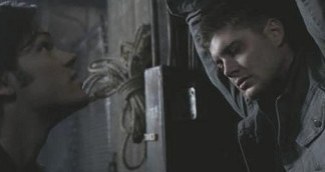
This is reminiscent of his actions in season 6, where although he regrets having to leave his happy, normal life he admits it’s not truly what sustains him. This confession will come in “You Can’t Handle the Truth” where Deans state of mind is made bare against his will. For this reason, not because of the people who would otherwise suffer, he chooses reality over fantasy. He may or may not realize it now, but again, the fact the cases he and Sam tackled existed at all in his dream state suggest its a part of him he wishes to continue to indulge in. He can’t let that life go, even under the most extreme and supernatural (drugged) of circumstances. The Djinn can’t take it away from him because he needs it. If something is a part of your ideal, and in your ideal you are forced back into it, then it is your ideal, wish for temporary reprieve not withstanding. Even the happiest of people want a vacation from time to time, after all.

Now we get to cut through that loose bit of thread that still ties this series down and allow it to spread its wings, Azazel’s demise, as well as bring Sam’s destiny one step closer to realization. “All Hell Breaks Loose” Parts 1 and 2 finally conclude Azazel’s plan for the chosen children. Sam is pitted in a “free for all” death match against other psychic children in an abandoned town. Sam is intentionally given a handicap, having been chosen for the final batch which we’ll later realize is because Azazel prefers him. Through several twists and turns, we’re left with just two candidates: Sam and another man with super human strength. The roadhouse is found burned to the ground by Dean and Bobby, with Ash turned to ashes (had to) but Ellen nowhere to be found and Jo having been nowhere near there since she is still supposedly hunting. Dean figures out where Sam resides.

In a moment of weakness (which includes seeing his brother, of course) Sam is stabbed to death, much to Dean’s unrelenting despair. This “weakness” of theirs when it comes to each other will be heavily explored throughout the series’s surface, but here is used in a much more subtle way. Their weakness for each other is not because of how much they care for each other, but because how much they need each other. While on the surface the series would like us to believe the former, the latter becomes more and more apparent as the cycle of lies and sacrifice continue through season 10.

And speaking of sacrifice: here we have the first act that will snowball into their unhealthy obsession with self sacrifice. Remember when Dean nearly left his family in turmoil to leave for the afterlife, willingly I might add? What happens to that Dean coming up? Well, his father happened for one. Second, he’s left all alone (in his mind) otherwise.

Dean summons a crossroads demon, and offers his soul for Sam’s life under the normal ten year time frame. The demon refuses, instead offering him one year in exchange. Dean hesitates only a moment before accepting. Dean at the beginning of this season would not have attempted the summon, let alone take ten years and sell his soul, and certainly not ultimately accept the one year deal. Remember when he said he’d rather die then kill Sam? Well here he one ups, two, ten ups that confession, revealing he’d rather rot in Hell (literally) then live without his brother. Powerful stuff.
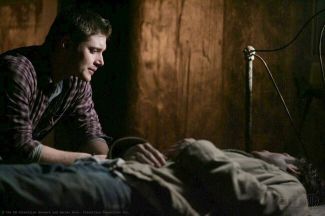
But in actuality, it’s not. It’s weakness, not strength. It’s telling of just how unhealthy Dean’s state of mind really is. He’s not doing it for his brother here, he’s doing it for himself. Dean isn’t aware of where Sam’s soul now resides. As Sam will enlighten him in season 3, he will be leaving Sam in the same situation Dean is in now, only Sam is aware of Dean’s fate after death. This leaves Sam in a far worse situation, but Dean doesn’t care. He won’t live another moment without him, he can’t. It’s not selfless, it’s selfish. These are highly flawed characters as much as the surface attempts to portray them as noble, and only those willing to read the subtext will appreciate this. Multiple characters will allude to their unhealthy habits when pertaining to each other and see through their deception, including Bobby on many occasions, which gives the audience something tangible to contemplate. But otherwise, it isn’t until season 10 that the subtext becomes text, again, with their obsession and true motif made bare and apparent for all to witness.
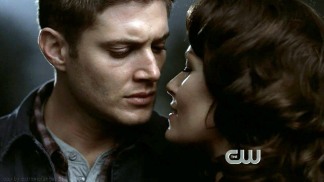
Sam’s life is restored much to his surprise. Dean does not reveal he made a deal initially (of course), instead leaving Sam to believe he was merely wounded and unconscious. They drive over to Bobby’s, and Bobby – though horrified – plays along since he too knew of Sam’s death. He reprimands Dean (like the surrogate father he’s become, something expanded upon in season 3) and gets the truth out of him.

This is why I love Bobby: he is the voice of reason on every occasion. He is the one thing in the Winchester’s life that grounds them, that keeps the brothers fractured psyches from completely shattering. He is the father they needed, not the father they had. His death will cause a tumble where they will slowly but surely spiral uncontrollably, rather then gradually as before, into the deepest of holes reaching absolute rock bottom within a few seasons. He guides them. He councils them. He loves them like his own flesh and blood. He is an example of a healthy attachment, because he will do almost anything to protect them but will never sacrifice his own life after the fact, nor the life of others, to bring them back from death or otherwise permanent circumstances. He understands and is able to cope with their loss on every occasion, albeit usually in a binge drunken way, but heck, everyone has their coping mechanisms right?

Bobby and the boys discover Azazel’s plot: to open up a Devil’s Gate, or door to Hell, that is off limits to him due to an enormous devil trap, in the form of a railway, spanning several states that keeps him from stepping inside. Azazel convinces the final psychic to open the gate for him in exchange for not harming his family. The Colt is the key, because it was Samuel Colt who built the door and set the trap, giving us an alternate motive for Azazel wanting it so badly. Sam, Dean, Ellen (who arrived at Bobby’s shortly before setting off) and Bobby arrive just as the psychic is about to open the gate. They are unable to restrain him, and he succeeds in unlocking it. Sam shoots him several times dead in cold blood, with no hesitation despite having already failed to keep the door from opening (a subtle reminder that he is still on the path to darkness).

Dean retrieves the colt, demons pour out from the door in a massive stampede, and a shock wave breaks a line in the railway thus rendering the trap useless.
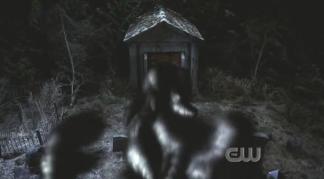
Azazel appears and takes the gun from Dean, knocking him several feet into the air in the process. He gloats to Dean and reveals he’s relieved that he had Sam returned to life since he was his favorite (we’ll find out why exactly in season 5). He also asks Dean if he’s certain Sam came back “100% pure Sam” (Deans fear that he hasn’t being a point of emphasis for their relationship dynamic in season 3).

John’s spirit exits the door and attacks Azazel, removing him from the body he’s possessed. After Azazel wins the fight, he reenters the body only to find Dean aiming the Colt right at him. Dean fires its final shot and strikes Azazel, effectively killing the demon who brought upon the boys’ current nightmare.
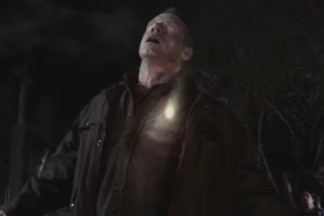
John gives the boys one final moment to see him, smiling as though proud, before he disappears. Sam finds out about Deans deal and vows to get him out of it.

Season 2 transitions the series from the anthololgy and cheap thrill based structure to a more character and arc driven show. As such, it’s a worthy addition to the series lore. It’s not a season that should be skipped, although you won’t be that lost if you do, thanks to adequate recap sequences considering the plot isn’t all that substantial in this season. It’s got its share of worthwhile episodes, even those not connected to the story arc, because they sow the seeds of the characters actions, and motives for said actions, going forward. The show has found its footing here at seasons end, and we can begin looking at individual outings and taking deeper peaks at just what exactly makes this series so under appreciated.
